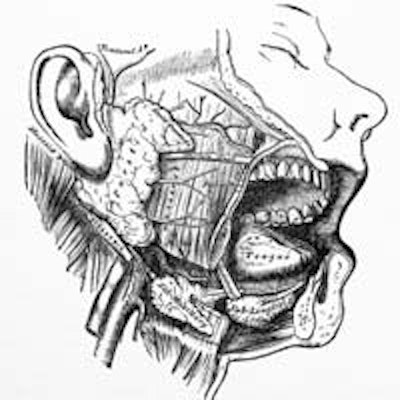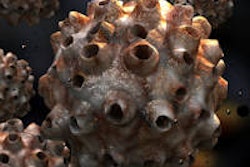
The incidence of oropharyngeal squamous cell carcinoma (OPSCC) is growing, and the human papillomavirus (HPV) is linked to an increasing number of such cases. Studies show that HPV-positive patients respond better to therapy, and less intensive therapy may be reasonable, according to a recent study in Cancer Treatment Reviews (September 30, 2013).
The major risk factors for head and neck squamous cell carcinoma have traditionally included smoking and drinking alcohol. However, despite declines in tobacco use, the number of patients with OPSCC continues to grow. Oropharyngeal cancers associated with HPV are increasing, especially among younger patients, but these patients have shown better survival rates than those with HPV-negative cancers.
Currently, about 20% to 30% of OPSCC patients don't smoke or drink much alcohol, yet studies show that most of their cancers are apparently driven by HPV, usually HPV type 16 (HPV16). Treatment recommendations for HPV-positive OPSCC patients are not currently different from those who are HPV-negative. However, clinicians and researchers have increasingly recognized the favorable biological and clinical behavior of OPSCC cases that are associated with HPV.
The current review by Nebraska researchers -- led by Aru Panwar, MD, MBBS, from the division of head and neck surgery at the University of Nebraska Medical Center -- outlines the possibility of using less intensive therapy for OPSCC patients who are HPV-positive. The study's goal is improving treatment outcomes while reducing treatment-related toxicity, particularly dysphagia and cranial neuropathies, and also lowering healthcare costs.
Chemo and radiotherapy for OPSCC patients
The review by Dr. Panwar and colleagues covered a number of trials.
A Danish trial assessed HPV16 status as a prognostic marker among OPSCC patients who were treated with conventional radiotherapy. The researchers found better five-year control rates of regional tumors (58% versus 28%), improved disease-specific survival (72% versus 34%), and better overall survival (62% versus 26%) for these patients, compared with OPSCC patients who did not have HPV16 (Journal of Clinical Oncology, April 20, 2009, Vol. 27:12, pp. 1992-1998).
The Danish researchers then evaluated the use of accelerated fractionated radiotherapy, which also showed improved disease-specific survival for OPSCC patients, both for HPV16-positive and HPV16-negative patients. After five years, patients who were treated with accelerated radiotherapy six times a week showed significantly improved control of their regional tumors, compared with those treated five times weekly. In particular, the HPV16-positive patients had better disease-specific survival rates (Radiotherapy & Oncology (July 2011, Vol. 100:1, pp. 49-55).
And the Eastern Cooperative Oncology Group evaluated the therapeutic responses of patients with late-stage squamous cell carcinoma. HPV-positive patients who received chemotherapy (paclitaxel and carboplatin) and standard fractionated radiation therapy showed marked overall improved survival rates at two years compared with HPV-negative patients (95% versus 62%) and lower mortality rates (Journal of the National Cancer Institute, February 2008, Vol. 100:4, pp. 261-269).
Transoral laser microsurgery and robotic surgery
The current study noted a growing interest in using transoral laser microsurgery (TLM) and transoral robotic surgery (TORS), especially for HPV-positive OPSCC patients. In a multicenter study of 204 patients with advanced OPSCC, researchers found three-year overall survival rates of 86%. When TLM was the primary treatment, the researchers found significant overall favorable outcomes for the patients. And when TORS was used for OPSCC patients who were HPV-positive, the therapy produced local, regional, and distant tumor control rates of 90.9%, 100%, and 100%, respectively (Ear Nose & Throat Journal, February 25, 2013).
Another study found a 97% local disease control rate after 2.7 years using TORS as a single modality for OPSCC (JAMA Otolaryngology -- Head & Neck Surgery, July 1, 2012, Vol. 138:7, pp. 628-634).
"Single-modality treatment with surgery may be associated with improved functional outcomes," the reviewers concluded.
Less intensive therapy for OPSCC?
It's still unclear which subsets of OPSCC patients may most benefit from a de-escalation of conventional therapy, according to the researchers.
"There is evidence that although a threshold for possible de-escalation of treatment may exist, such a line remains blurry at best for now," they wrote.
But several emerging therapies may benefit OPSCC patients who are HPV-positive, the reviewers noted. These therapies include epidermal growth factor receptors such as inhibitor axitinib and programmed death ligand inhibitors.
There is also interest in immunotherapeutic options such as stimulated E6 and E7 protein-specific cytotoxic T-cells in HPV-positive OPSCC cases.
Conclusion
"The recognition of HPV-mediated OPSCC as a distinct entity has enabled a better understanding of its biologic and clinical behavior," the reviewers wrote.
They noted that HPV-mediated OPSCC responds more favorably to current therapies, but they also noted that it is likely that the relative survival of these patients may be independent of the therapy used.
"There is increasing evidence to support the notion that de-escalation of therapy for HPV-mediated OPSCC patients may be reasonable," the researchers concluded. "However, current recommendations do not support modification of treatment for OPSCC based on determination of HPV status, except in a clinical trial setting."
Upcoming trials could help identify specific patients for whom scaling down therapeutic interventions will result in improved quality of life without compromising their survival, they said.



















